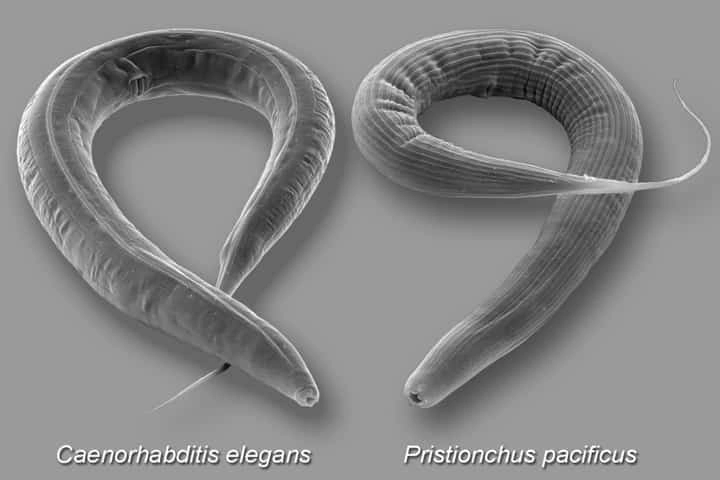

Picture of Caenorhabditis elegans and Pristionchus pacificus (Pics Courtesy Dr. Ralf Sommer, Max Planck Institute for Developmental Biology)
<p>
<strong>Appearances are deceptive and so is the brain power based on the number of brain cells or neurons. Proving this are 1-millimetre-long worms which have merely 300 neurons yet shocked the scientific community by their capability to make complex decisions.</strong></p>
<p>
A report in livescience.com mentions that these worms exhibit varied behaviour depending on the situation they face &ndash; all this with just scanty neuron power. A comparison of these creatures with human beings provides a better understanding of this fact &ndash; they have 285 million times fewer neurons than humans who are blessed with nerve cells numbering about 86 billion!</p>
<p>
Proof of this ability to make difficult choices was observed in Pristionchus pacificus, a predatory species which competes or kills to eat the worm Caenorhabditis elegans. The two grow to 1 millimetre in length and primarily feed on bacteria. Significantly, P. pacificus can and does eat C. elegans, in case there is a scarcity of bacteria.</p>
<p>
<strong>Also read: <a href="https://www.indianarrative.com/science-news/secret-of-squirrels-long-winter-hibernation-can-help-astronauts-go-to-faraway-planets-148075.html">Secret of squirrels&rsquo; long winter hibernation can help astronauts go to faraway planets</a></strong></p>
<p>
Scientists discovered that P. pacificus often bite C. elegans during their clash for feeding on bacteria. Interestingly, these bites can be for eliminating the competitors or giving them a warning.</p>
<p>
Another fascinating detail noted by researchers was that when P. pacificus came across C. elegans larvae in the lab, they liquidated them but during their interaction with the adult of the species they imparted bites that were not lethal. These were more in the nature of warning making C. elegans to scoot. Though equipped to kill the adult C. elegans, P. pacificus avoids it as it entails more energy and is risk prone. Researchers feel that probably the size and life stage of C. elegans is what makes P. pacificus decide on whether to kill or not.</p>
<p>
<img alt="" src="https://www.indianarrative.com/upload/news/Pristionchus_pacificus.webp" style="width: 720px; height: 480px;" /></p>
<p>
<em>Pristionchus pacificus&nbsp;</em></p>
<p>
Elaborating on this point in a statement, the study&rsquo;s lead author Kathleen Quach who is a neurobiologist at the Salk Institute for Biological Studies in La Jolla, California, said: <a href="https://www.livescience.com/worms-make-complex-decisions-with-300-neurons?utm_source=SmartBrief&amp;utm_medium=email&amp;utm_campaign=368B3745-DDE0-4A69-A2E8-62503D85375D&amp;utm_content=A0E38D3C-D4D4-4DA9-BB9A-102BE7EDC9F9&amp;utm_term=c2029947-e980-4274-bc11-2f4c117930b6">&quot;Scientists have always assumed</a> that worms were simple. Actually, P. pacificus is versatile and can use the same action (biting C. elegans) to achieve different long-term goals.&quot;</p>
<p>
It is pertinent to note that when the quantity of bacteria is less, then P. pacificus without taking into account the age of C. elegans goes for the kill. All these decisions suggest that the nematodes are capable of factoring numerous types of information before arriving at a particular course of action. The skill to calculate the costs and benefits accruing from multiple actions is usually credited to vertebrates as researchers thought the invertebrates can&rsquo;t do it.</p>
<p>
The scientists have not been able to put their finger on how P. pacificus makes these complex decisions. They, however, impeded the worm&rsquo;s production of dopamine, the neurotransmitter that fires nerve cells, and this resulted in the worms giving territorial bites to adult C. elegans. Likewise, when production of octopamine, a neurotransmitter exclusively found in invertebrates, was hindered, the focus of the worms shifted from adult C. elegans worms to the larvae</p>
<p>
Based on these observations, the researchers mentioned in their paper that these two neurotransmitters probably played a vital role in making decisions.</p>
<p>
<strong>Also read: <a href="https://www.indianarrative.com/science-news/beavers-skilled-engineers-who-are-changing-life-in-the-arctic-for-the-worse-142331.html">Beavers – Skilled &#39;engineers&#39; who are changing life in the Arctic for the worse</a></strong></p>
<p>
Detailing on the line of their future research, the team mentioned that they planned to study the decision-making process of P. pacificus in different scenarios, and also try to comprehend the role of neurotransmitters in that process.</p>
<p>
Summing up the study, its co-author Sreekanth Chalasani remarked in the statement: &quot;Even simple systems like worms have different strategies, and they can choose between those strategies, deciding which one works well for them in a given situation. That provides a framework for understanding how these decisions are made in more complex systems, such as humans.&quot;</p>
<p>
Chalasani is a neurobiologist at the Salk Institute for Biological Studies.</p>
<p>
The findings of the study which have been published online in Current Biology, a journal has potential implications for artificial intelligence. As per Science Alert, the understanding how worms are able to make complicated choices with so few neurons could lead to AI algorithms that work with the fewest possible connections which would thereby greatly increase their efficiency.</p>
India's toy industry, once heavily dependent on imports, is now manufacturing domestically and exporting to…
Members of the Indian diaspora and several artists in Argentina welcomed Prime Minister Narendra Modi…
Sub Lieutenant Astha Poonia officially became the first woman to be streamed into the fighter…
As Israel awaits Hamas's response on Friday to the latest proposal for a hostage release…
Deputy Chief of Army Staff (Capability Development and Sustenance), Lieutenant General Rahul R Singh, on…
A report on Bangladesh's media landscape has revealed that the restrictive laws and political press…